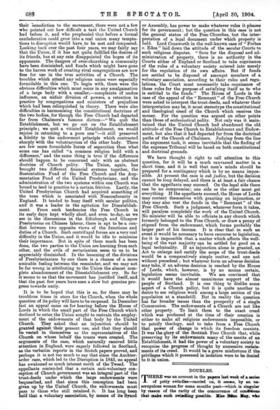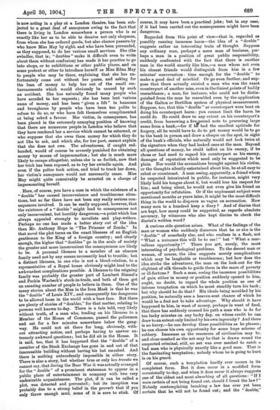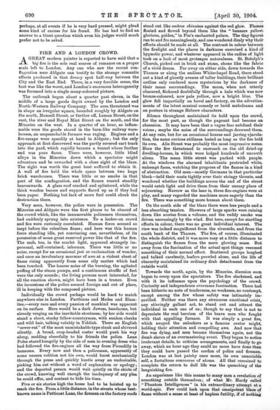MHERE was an account in the papers last week of
a series of petty swindles—carried on, it seems, by an un- scrupulous woman for some months past—which is singular by reason of the rarity of the concurrence of conflibions that liake such swindling possible. Las Edna /lay, who
is now acting in a play at a London theatre. has been sub- jected to a great deal of annoyance owing to the fact that there is living in London somewhere a person who is so exactly like her as to be able to deceive not only shopmen, from whom she has ordered goods, but also chance passers-by who know Miss May by sight, and who have been persuaded, as they supposed, to do her various small services. She (the swindler, that is ; " doubles " make it difficult even to write about them without confusion) has made it her practice to go into shops, or to exhibitions or other public places, and on some pretext or other to introduce herself as Miss Edna May to people who may be there, explaining that she has un- fortunately come out without her puree, and asking for the loan of money to help her out of the small em- barrassments which would obviously be caused by such an accident. She has naturally found many people who have acceded to her requests ; she has been lent various sums of money, and has been "given a lift" in hansoms and broughams by people who have been too polite to refuse to do so, or who have felt themselves complimented at being asked a favour. Her victim, in consequence, has been placed in the extremely annoying position of knowing that there are numerous people in London who believe that they have rendered her a service which cannot be returned, or who suppose that she owes them money for which they do not like to ask, and which she, for her part, cannot explain that she does not owe. The adventuress, if caught red- handed, would of course be severely punished for obtaining money by means of impersonation ; but she is much more likely to escape altogether, unless she is so foolish, now that her trick has been exposed, as to try her swindle again. And even if the police took action, and tried to track her down, her victim's annoyance would not necessarily cease. Miss May might quite conceivably be arrested on a charge of impersonating herself.
Here, of course, you have a case in which the existence of a " double " has caused inconvenience and troublesome situa- tions, but so far there have not been any really serious con- sequences involved. It can be easily supposed, however, that the existence of a " double " might lead to consequences not only inconvenient, but horribly dangerous,—a point which has always appealed strongly to novelists and play-writers. Perhaps no one has made a better story out of the idea than Mr. Anthony Hope in "The Prisoner of Zenda." In that novel the plot turns on the exact likeness of an English gentleman to the King of a foreign country ; and clearly enough, the higher that " doubles " go in the scale of society the greater and more inconvenient the consequences are likely to be. A personal likeness to a member of an obscure family need not by any means necessarily lead to trouble; but a distinct likeness, in one who is not a blood-relation, to a representative of a Royal house obviously might lead to the awkwardest complications possible. A likeness to the reigning family was probably the greater part of Lambert Simnel's and Perkin Warbeck's stock-in-trade, and both of them got an amazing number of people to believe in them. One of the many stories about the Man in the Iron Mask is that he was the " double " of Louis XIV., and consequently too dangerous to be allowed loose in the world with a bare face. But there are plenty of stories of "doubles," for that matter, relating to persons well known to-day. There is a tale told, very likely without truth, of a man who, trading on his likeness to a Member of the House of Commons, passed the policemen and sat for a few minutes somewhere below the gang- way. He could not sit there for long, obviously, with- out attracting notice, and perhaps having to answer ex- tremely awkward questions; but he did sit in the House. It is said, too, that it has happened that the "double" of a member of the Stock Exchange has gone in and out of that inaccessible building without having his hat smashed. And there is nothing antecedently impossible in either story. There is also a story, but whether true or only ben trovato we cannot say, that during the Boer War it was actually arranged for the " double" of a prominent statesman to appear in a public place of entertainment in company with two very undesirable acquaintances. The plot, if it can be called a plot, was detected and prevented ; but its inception WBA probably due to a strong belief in the proverb that if you only throw enough mud, some of it is sure to stick. Of
course, it may have been a practical joke; but in any case, if it had been carried out the consequences might have been dangerous.
Regarded from this point of view—that is, regarded as possibly causing immense harm—the idea of a "double" suggests rather an interesting train of thought. Suppose any ordinary man, perhaps+ a mere man of business, per- haps a man in a position of great public responsibility, suddenly confronted with the fact that there is another man in the world exactly like him,—a man whom not even his closest friends would distinguish from him in a few minutes' conversation : time enough for the " double " to make a good deal of mischief. Or go even further, and sup- pose that there actually existed a man who was the exact
counterpart of another man, even in the tiniest points of bodily resemblance ; a man, for instance, who could not be distin- guished from the man he resembled even by the application of the Galton or Bertillon system of physical measurement. Suppose, too, that this " double " or counterpart were bent oh doing his counterpart harm : you cannot limit the harm he could do. He could draw to any extent on his counterpart's credit, from borrowing a five.ipound note to procuring large sums from a bank,—for if hg had the smallest aptitude for forgery, all he would have to do to get money would be to go to the bank in person and draw a cheque on the spot, in sight of the bank's officials, who naturally would not look twice at the signature when they had looked once at the man. Beyond all questions of money, he could inflict on his enemy, if he chose or had need to regard his counterpart as his enemy, damages of reputation which need only be suggested to be plain. Nor would the accusations brought against his victim, or the thoughts silently entertained about him, be at all easy to rebut or counteract. A man seeing, apparently, a friend whom he respected intoxicated in public, for instance, might very likely hold his tongue about it, but would lose his respect for him; and being silent, he would not even give his friend an opportunity for refutation. Or if the unpleasant subject were mentioned months or years later, it might be the most difficult thing in the world to disprove so vague an accusation. How many men in a hundred keep a diary ? And of diaries that are kept, how many could be supported, as regards absolute accuracy, by witnesses who also kept diaries to check the diarist's written word ?
A curious side question arises. What of the feelings of the man or woman who suddenly discovers that he or she is the " double " of somebody else, and who realises in a flash, not "What a nuisance this will be to me ! " but "What a mar- vellous opportunity !" There you get, surely, the most interesting of psychological problems. To the decent man or woman, of course, the idea suggests merely complications which may be laughable or troublesome; but how does the idea strike the adventurer, the man on the look-out for the slightest of silk threads to guide them in the maze of poverty or ill-fortune ? Such a man, seeing the immense possibilities of gain either in money or position suddenly opened to him, ought, no doubt, to regard the whole position as one of intense temptation on which he must steadily turn his back ; but why should he do that ? His ideals being moulded by his position, he naturally sees a heaven-sent chance of which he would be a fool not to take advantage. Why should it have happened to him, in want of money, perhaps in want of food, that there has suddenly crossed his path a man who is he for ten lucky minutes on any lucky day, on whose credit he can
draw to an extent only limited by his own ingenuity ? And there is no huri7,—he can develop these possibilities as he pleases ; he can choose his own opportunity for some huge scheme of robbery. Immense as the resources of civilisation may be, and close-meshed as the net may be that is drawn round the suspected criminal, still, no net was ever meshed to catch a bad man who is physically exactly like a good man. That is the fascinating temptation ; nobody whom he is going to hurt is on his guard.
Of course, such a temptation hardly ever occurs in its completest form. But it does occur in a modified form occasionally to-day, and when it does occur it always suggests
one of the oldest and most absorbing of all questions : "If I were certain of not being found out, should I break the law ?"
Nobody contemplating breaking a law has ever yet been certain that he will not be found out; and the "double," perhaps, at all events if he is very hard pressed, might plead some kind of excuse for his fraud. He has had to find an answer to a blunt question which even his judges would much prefer not to be asked.
























































 Previous page
Previous page